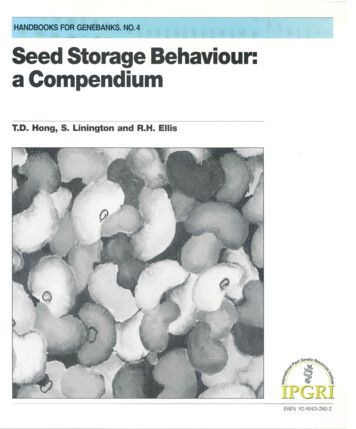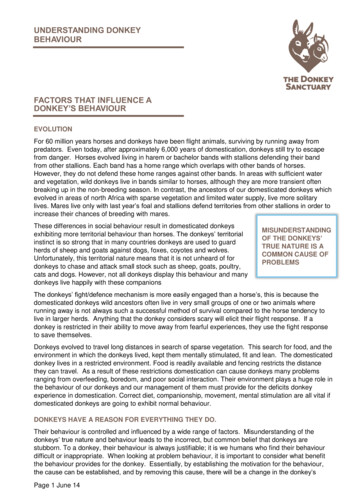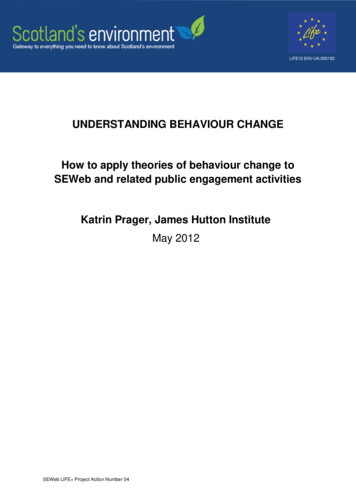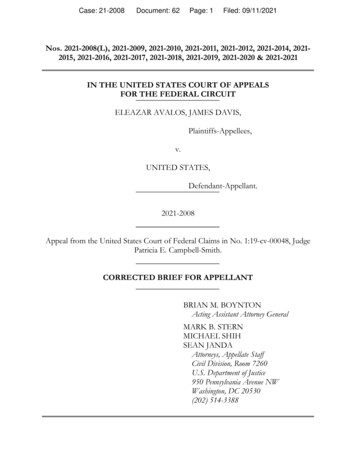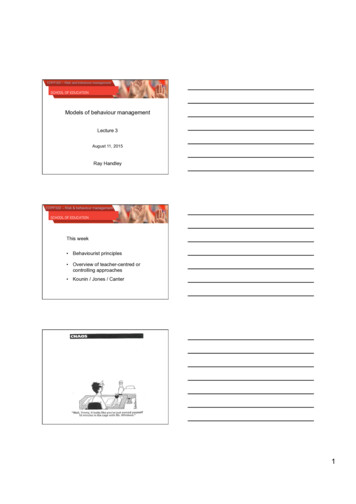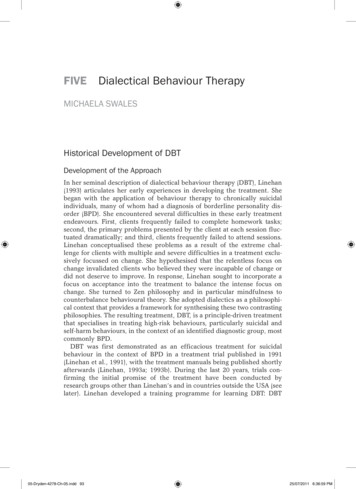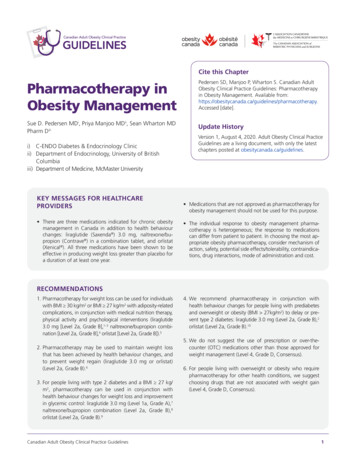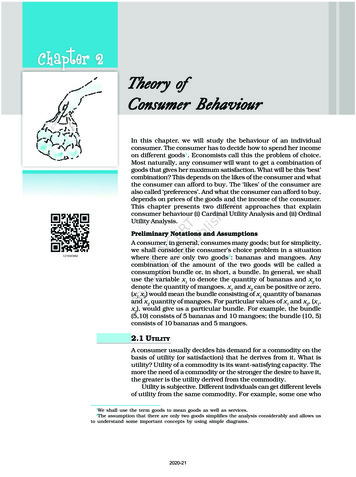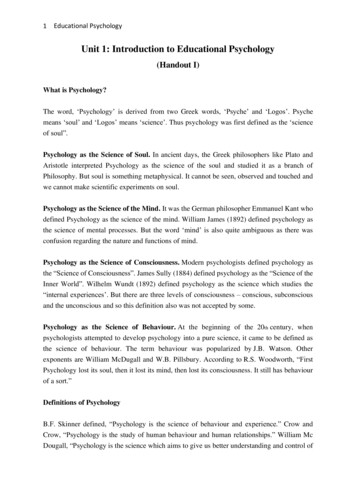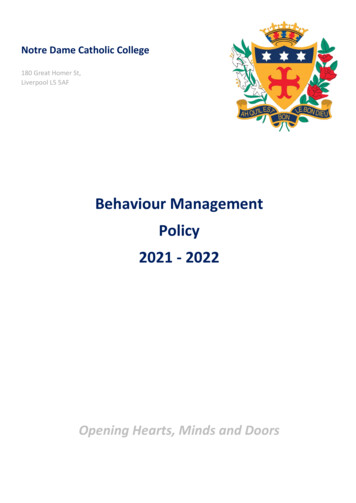
Transcription
Notre Dame Catholic College180 Great Homer St,Liverpool L5 5AFBehaviour ManagementPolicy2021 - 2022Opening Hearts, Minds and Doors
Behaviour Management PolicyNotre Dame Catholic CollegeOpening Hearts, Minds and DoorsBehaviour Management PolicyContentsSection123456778910111213ContentWhy do we have this Policy?LegislationDefinitionHow does the School respond?Behaviour and ExclusionsRestraint of Pupils and the use of ForceScreening and SearchingConclusionPrevention StrategiesHome College CommitmentParent / Carer CommitmentCollege CommitmentBehaviour LadderThe Notre Dame WayPage334589109111314151617Opening Hearts, Minds and DoorsPage 2 of 18Policy OwnerApproved byApproval dateReview frequencyEB/MCFGB14/10/2021AnnualIssue No.8
Behaviour Management PolicyNotre Dame Catholic CollegeOpening Hearts, Minds and DoorsWhy do we have this policy?At Notre Dame Catholic College we strive to reflect Gospel values in all our relationships. The inherent qualityand value of each individual pupil is recognised. Good behaviour for learning in the school communitydepends on relationships based on mutual trust and respect. We recognise that positive responses andaffirmation are the means by which we can maximise behaviour for learning and ensure all students canachieve great things at Notre Dame Catholic College. In particular we have this policy to: Assist pupils to express themselves correctly and appropriately and to promote self-disciplineand self-esteem. Encourage good behaviour for learning and respect for others Ensure equality and fair treatment for all Provide a safe environment free from disruption, violence, discrimination, bullying and any form ofharassment Provide opportunities for pupils to take responsibility for their own behaviour for learning. Ensure that pupils’ behaviour is acceptable to the community at large. Enable effective teaching and learning to take place by having good behaviour for learning in allaspects of school life Create an environment in which pupils feel safe and are able to achieve more than they thoughtthey could. Encourage pupils to have respect for their learning environment, facilities and equipment. Encourage pupils to be equipped for learning with the appropriate equipment.The school acknowledges that behaviour can sometimes be the result of educational needs, mental healthissues, or other needs or vulnerabilities, and will address these needs via an individualised graduatedresponse.To help reduce the likelihood of behavioural issues related to social, emotional or mental health (SEMH), theschool aims to create a safe and calm environment in which positive mental health and wellbeing arepromoted and pupils are taught to be resilient. The school aims to promote resilience as part of a wholeschool approach using the following methods: Culture, ethos and environment – the health and wellbeing of pupils and staff is promoted through theinformal curriculum, including leadership practice, policies, values and attitudes, alongside the socialand physical environment Teaching – the curriculum is used to develop pupils’ knowledge about health and wellbeing Community engagement – the school proactively engages with parents, outside agencies and thewider community to promote consistent support for pupils’ health and wellbeingWhere vulnerable pupils or groups are identified, provision will be made to support and promote theirpositive mental health.LegislationThis policy has due regard to statutory legislation, including, but not limited to, the following: Education Act 1996Education Act 2002Page 3 of 18Policy OwnerApproved byApproval dateReview frequencyEB/MCFGB14/10/2021AnnualIssue No.8
Behaviour Management PolicyNotre Dame Catholic CollegeOpening Hearts, Minds and Doors Equality Act 2010Education and Inspections Act 2006Health Act 2006Voyeurism (Offences) Act 2019The School Information (England) Regulations 2008DfE (2016) ‘Behaviour and discipline in schools’DfE (2021) ‘Keeping children safe in education 2021’DfE (2021) ‘Sexual violence and sexual harassment between children in schools and colleges’DfE (2018) ‘Mental health and behaviour in schools’DfE (2015) ‘Special educational needs and disability code of practice: 0 to 25 years’DfE (2013) ‘Use of reasonable force’DfE (2018) ‘Searching, screening and confiscation’This policy should be used in conjunction with the following school documents: Uniform guidance Home-School Agreement Code of ConductDefinitionThe phrase ‘behaviour for learning’ conceptualises the following three relationships experienced by apupil: Their relationship with themselves, e.g. their self-confidence as a learner Their relationship with others, e.g. how they socially interact Their relationship with the curriculum, e.g. how best they learnFor the purposes of this policy, the school defines “serious unacceptable behaviour” as any behaviourwhich may cause harm to oneself or others, damage the reputation of the school within the widercommunity, and/or any illegal behaviour. This includes, but is not limited to, the following: Discrimination – not giving equal respect to an individual on the basis of age, disability, genderidentity, marriage and civil partnership, pregnancy and maternity, race, religion or belief, sex, andsexual orientation Harassment – behaviour towards others which is unwanted, offensive and affects the dignity of theindividual or group of individuals Vexatious behaviour – deliberately acting in a manner so as to cause annoyance or irritation Bullying – a type of harassment which involves personal abuse or persistent actions which humiliate,intimidate, frighten or demean the individual being bullied Cyberbullying – the use of electronic communication to bully a person, typically by sending messagesof an intimidating or threatening nature Possession of legal or illegal drugs, alcohol or tobaccoPage 4 of 18ReviewfrequencyPolicy OwnerApproved byApproval dateIssue No.EB/MCFGB14/10/2021Annual8
Behaviour Management PolicyNotre Dame Catholic CollegeOpening Hearts, Minds and Doors Possession of banned itemsTruancy and running away from schoolRefusing to comply with disciplinary sanctionsTheftVerbal abuse, including swearing, racist remarks and threatening languageFighting and aggressionPersistent disobedience or destructive behaviourExtreme behaviour, such as violence and serious vandalismAny behaviour that threatens safety or presents a serious danger Any behaviour that seriously inhibitsthe learning of pupils Any behaviour that requires the immediate attention of a staff memberFor the purposes of this policy, the school defines “low-level unacceptable behaviour” as any behaviourwhich may disrupt the education of the perpetrator and/or other pupils, including, but not limited to, thefollowing: Lateness Low-level disruption and talking in class Failure to complete classwork Rudeness Lack of correct equipment Refusing to complete homework, incomplete homework, or arriving at school without homework Disruption on public transport Use of mobile phones without permission Graffiti“Low-level unacceptable behaviour” may be escalated to “serious unacceptable behaviour”, depending onthe severity of the behaviour.How Does the School Respond?Staff members will: Maintain a positive and well-managed learning environment. Use the school’s reward system and hierarchy of sanctions to promote good behaviour for learning. Use the rules and consequences outlined in this policy clearly and consistently. Treat all pupils fairly and equally, seeking to raise their self-esteem and develop to their full potential. Undertake comprehensive planning to provide challenging, interesting and relevant lessons, whichare appropriate to the age, ability and individual needs of pupils. Record all behavioural events, both positive and negative, on the school’s management informationsystem, Class Charts, by following the correct reporting procedure. Raise any concerns regarding pupils’ behaviour for learning with the relevant curriculum leader,form tutor or head of year or Director of Behaviour Take the necessary steps to effectively manage pupil behaviour. Support other members of staff with behavioural issues involving individual pupils or groups of pupils.Page 5 of 18Policy OwnerApproved byApproval dateReview frequencyEB/MCFGB14/10/2021AnnualIssue No.8
Behaviour Management PolicyNotre Dame Catholic CollegeOpening Hearts, Minds and Doors Liaise with other members of staff, Directors of Behaviour and the senior leadership team (SLT)in order to implement effective behaviour management. Organise detentions where appropriate. Intervene promptly when they encounter poor behaviour for learning ( in classrooms or in communalareas) or unexplained absence. Immediately contact the Directors of Behaviour, a member of leadership or the headteacher whenthere has been a serious breach of the school’s Code of Conduct. School governors will be updated on termly basis regarding the intent, implementation and impact ofschool behaviour, updates, policies and procedures. Contact parents/carers regarding their child’s behaviour where necessary. Continuously keep parents/carers informed of any behavioural management issues concerning theirchild e.g. via Class Charts, letters, phone calls etc. Pastoral support is available to students whose behaviour is not meeting the expectations of staff andthe school ethos. Interventions may include being referred to the Inclusion Manager or BehaviourLeads to be Thrive assessed, mentoring of pupils who receive excessive warnings (e.g. 5 C3s in aHalf term, 5 C3s in a subject - form or subject report cards), report card mentoring (e.g. Head of Year,Form tutor, Leadership or Success Card Programs), etc.Opening Hearts, Minds and Doors Act in accordance with the school’s Exclusion Procedure when dealing with more serious breachesof school conduct. Monitor the attitude, effort and quality of the pupils’ work. Make referrals to external agencies where necessary. Inform the Directors of Behaviour/SLT of relevant behaviour data and trends. Ensure that all records are kept up-to-date e.g. serious incident log, class charts etc. Consistently develop their understanding of behaviour for learning and relevant techniques as part oftheir CPD. Every member of staff has the responsibility to establish orderly conduct of pupils in school, bothwithin lessons and around the school site, as well as implementing this policy both fairly andconsistently Every teacher should have a presence in the corridor, close to their teaching area, between lessonsto encourage an orderly and punctual transition between lessons. All staff have a responsibility to address incidents of poor behaviour for learning if they encounterthem as they move about the school. In serious cases of unacceptable behaviour, or if a seriousincident has taken place, staff should seek the assistance of a senior member of staff. The memberof staff who witnesses the incident should then record this on class charts. Staff powers to disciplineare at the discretion of the Headteacher; All staff will be positive ambassadors of the school at all times, through their professional behaviourand conduct.Page 6 of 18Policy OwnerApproved byApproval dateReview frequencyEB/MCFGB14/10/2021AnnualIssue No.8
Behaviour Management PolicyNotre Dame Catholic CollegeOpening Hearts, Minds and Doors The school uses the Class Charts behaviour management system to record incidents of positiveand negative behaviour. The school will respond to feedback from parents/carers regardinginformation held in these management systems. Heads of Departments, Heads of Year and Assistant Heads of Year should check the Class Chartssystem daily; Every teacher has the responsibility to ensure that pupils follow the school code of conduct. Pastoralstaff will follow the pastoral procedures for equipment checks and uniform infractions during formtime. Pupils are to wait quietly outside the classroom until invited to enter by the teacher. Pupils should sit (in a seating plan) as directed by the teacher. Behaviour for learning deemed to be acceptable should be encouraged, affirmed and rewarded. When poor behaviour for learning is identified sanctions will be implemented consistently andfairly in line with this policy. Behaviour for learning which prevents others from learning and/or which is lacking in respect shouldbe dealt with immediately and appropriately according to the current disciplinary procedures Disruptive pupils should be removed from a lesson and referred to the Head of Department orother designated members of staff as a result of persistent poor behaviour for learning (Seebehaviour for learning ladder for clarification of C3s) There is an on call rota which provides staff with assistance if required. Staff may call forassistance or to have a pupil removed to the ‘Referral Room’. If a member of on call is notavailable teaching staff can send a student for support from a colleague if required. Staff will ensure the health and safety of the pupils and any requirements in relation tosafeguarding and pupil welfare. P u p i l s who find it difficult to manage their own behaviour for learning will have the opportunity toaccess the referral room and to take part in special programmes led by the behaviour team/pastoralteam or external agencies. The Headteacher and staff authorised by the Headteacher, in consultation with parent/carers, havethe authority to work with other local agencies to assess the needs of pupils who display disruptivebehaviour for learning. Where necessary, teachers will undertake INSET in order to be best placed to implement avariety of behaviour for learning management strategies. All departmental handbooks will contain specific reference to the appropriate disciplinary procedures. Staff may give a detention to a pupil without parental consent, but the member of staff must actreasonably when imposing a detention. Parents will receive notifications of detentions viaClass Charts. If a student does not attend their detention they may be placed in the referralroom the following day. Staff may search a pupil and their possessions, with their consent, for any item. If a personal searchis considered necessary it is to be carried out by a person who is the same sex as the pupil involvedand is to be witnessed by a person of the same sex. The Headteacher and staff authorised by the Headteacher have the power to search pupils or theirpossessions without consent where they suspect the pupil has a prohibited item (knives andweapons, alcohol, vapes, illegal drugs, stolen items, tobacco or cigarette papers, fireworks,pornographic images, inflammatory materials of a religious, political, racist, homophobic or sexistnature, or any item that could be used to commit an offence, injury or damage to property). Theseitems will be disposed of as seen fit by the school but never given back to the pupil. Knives,weapons, pornographic and/or any other illegal material will be handed to the police. Pupils are strongly advised not to bring mobile phones to school. The use of mobile phones, by pupils,during the school day is not permitted. If a member of staff sees or hears a mobile phone it will beconfiscated and may be collected at the end of the school day.Page 7 of 18Policy OwnerApproved byApproval dateReview frequencyEB/MCFGB14/10/2021AnnualIssue No.8
Behaviour Management PolicyNotre Dame Catholic CollegeOpening Hearts, Minds and Doors Staff are allowed to confiscate mobile phones or electronic devices without consent, and data or filescan be examined if there is a good reason to do so, which may result in the need to erase files ordata before returning the device, if it is felt they could cause harm, disrupt teaching or break theschool rules. The Headteacher or staff authorised by the Headteacher will decide if this course ofaction is suitable. Staff must ensure, where possible, that another member of staff is presentwhen an item is confiscated. Once a mobile device is confiscated it will be placed in a sealed envelope which is clearly labelledwith the name of the pupil. On the first confiscation incident the d evice may be collected at theend of day by the pupil. Subsequence confiscations will require a parent/carer to come to the schoolto collect the mobile phone/device. Staff are protected from liability for damage to or loss of anyconfiscated items. The use of mobile phones by pupils is restricted unless authorised by theHeadteacher Fizzy drinks or isotonic drinks will be confiscated and destroyed by staff Any pupil who brings drinks/confectionery, in multiple quantities, onto the school premises withoutthe permission of the Headteacher, will have their goods confiscated and destroyed. The selling ofdrinks/confectionery is strictly prohibited within the school grounds without the permissionof the headteacher. Staff will use their professional judgement in deciding if a pupil’s propertyneeds to be searched for prohibited items. The standard of behaviour for learning expected will be included in the home-school agreementwhich parents will be asked to sign on their child’s admission to the school. The school behaviour policy will be updated annually on the school website and app. Parents will beinformed of the availability of the policy on the website/app and encouraged to read the document. Rules, standards and expectations regarding behaviour for learning will be communicated clearly toparents/carers, staff and pupils. The code of conduct (in the pupil planner) will be signed byparents/carers and pupils on an annual basis at the start of the new academic year. Staff have the authority to discipline pupils for misbehaving (non-criminal bad behaviour andbullying) outside of the school premises that has been witnessed by a member of staff orreported to the school. This includes: school-organised or school related activity; travelling toand from school; while the pupil is wearing the school uniform, or in some other way, identifiableas a pupil of the school.Behaviour and ExclusionsThe following list is not exhaustive or exclusive but provides an indication of the sort of behaviour oroffence that the school would consider serious enough to merit consideration of a fixed term exclusion orpermanent exclusion from school: Physical assault against pupils or adults;verbal abuse / threatening behaviour against pupils or adults;bullying;racism;sexual misconduct;sexual harassment;use of vapes on school property;drug and alcohol misuse;damage to property;theft;persistent disruptive behaviour;any conduct that significantly harms the reputation of the school;Page 8 of 18Policy OwnerApproved byApproval dateReview frequencyEB/MCFGB14/10/2021AnnualIssue No.8
Behaviour Management PolicyNotre Dame Catholic CollegeOpening Hearts, Minds and Doors bringing into school a prohibited item.persistent poor behaviourserious unacceptable behaviourany conduct which puts the safety of any member of the school community at risk;Not following instructions from staff;any conduct that facilitates, encourages or makes possible, any of the offences listedabove;Prohibited items are;Knives or weapons or any object that might be perceived to be a weapon orthreatening objectIllegal drugs or paraphernaliaStolen itemsTobacco and cigarette PapersFireworks or bangersPornographic imagesAlcoholVapesAny article that a member of staff reasonably suspects has been, or is likely to be, used to threaten orcause offence, or to cause personal injury to, or damage to the property of, any person (including thepupil).In all these circumstances the Headteacher should consider whether it is appropriate to notify thepolice.Should a pupil be suffering, or be likely to suffer, significant harm, staff should follow the schoolsafeguarding policy.Restraint of Pupils and the use of ForceNotre Dame Catholic College does not use corporal punishment. The guidance from the Department forEducation, “Use of Reasonable Force” (May 2012) enables school staff to use such force as is reasonablein the circumstances to prevent a pupil from doing, or continuing to do, any of the following: Committing any offence (or, for a pupil under the age of criminal responsibility, what would bean offence for an older pupil). Causing personal injury to, or damage to the property of, any person (including thepupil themselves).All members of the teaching and support staff have a legal right to use reasonable force for the reasonsoutlined above and this power may be temporarily extended to people authorised by the Headteacher totake charge of pupils, such as unpaid volunteers or parents accompanying pupils on school activities.Reasonable force will never be used as a punishment for a pupil – this is unlawful and unacceptable. Theschool also acknowledges its duty to make reasonable adjustments in the potential use of reasonableforce for disabled children or pupils with SEN.Page 9 of 18Policy OwnerApproved byApproval dateReview frequencyEB/MCFGB14/10/2021AnnualIssue No.8
Behaviour Management PolicyNotre Dame Catholic CollegeOpening Hearts, Minds and DoorsDetailed written records of serious incidents, including those requiring physical intervention by staff, willbe maintained by the school and reported to senior pastoral staff, including the Headteacher.Staff at the school will liaise with parents/carers at appropriate stages in the discipline procedures and anycomplaints will be dealt with according to the complaints policy, including malicious accusations againstschool staff. Sanctions used for pupils who are found to have made malicious accusations will be at thediscretion of the Headteacher and governing body.Screening and SearchingSchool staff can search a pupil for any item if the pupil agrees.Headteachers and staff authorised by them have a statutory power to search pupils or theirpossessions, without consent, where they have reasonable grounds for suspecting that the pupil mayhave a prohibited item. Prohibited items are: knives or weapons alcohol illegal drugs stolen items tobacco and cigarette papers or vapes fireworks pornographic images any article that the member of staff reasonably suspects has been, or is likely to be, used: to commit an offence, or to cause personal injury to, or damage to the property of, any person (including the pupil).Headteachers and authorised staff can also search for any item banned by the school rules which hasbeen identified in the rules as an item which may be searched for.School staff can seize any prohibited item found as a result of a search. They can also seize any item,they consider harmful or detrimental to school discipline.If a member of staff suspects a pupil has a banned item in his/her possession, they can instruct thepupil to turn out his or her pockets or bag and if the pupil refuses, the teacher can apply an appropriatepunishment as set out in the school’s behaviour policy.A pupil refusing to co-operate with such a search raises the same kind of issues as where a pupilrefuses to stay in a detention or refuses to stop any other unacceptable behaviour when instructed bya member of staff – in such circumstances, schools can apply an appropriate disciplinary penalty.(Searching, screening and confiscation Advice for headteachers, school staff and governing bodiesJanuary 2018)Page 10 of 18Policy OwnerApproved byApproval dateReview frequencyEB/MCFGB14/10/2021AnnualIssue No.8
Behaviour Management PolicyNotre Dame Catholic CollegeOpening Hearts, Minds and DoorsPrevention Strategies and Sanctions for Unacceptable BehaviourThis section outlines the school’s strategies for preventing unacceptable behaviour, minimising the severityof incidents, and using sanctions effectively and appropriately to improve pupils’ behaviour in the future.Positive Teacher-Pupil RelationshipsPositive teacher-pupil relationships are key to combatting unacceptable behaviour. Notre Dame CatholicCollege focusses heavily on forming these relationships to allow teachers to understand their pupils andcreate a strong foundation from which behavioural change can take place. All pupils have a form teacherand belong to a year group. Each year group have an Assistant Head of Year and a Head of Year to providepastoral support.De-escalation StrategiesWhere negative behaviour is present, staff members will implement de-escalation strategies to diffuse thesituation. This includes: Appearing calm and using a modulated, low tone of voiceUsing simple, direct language.Avoiding being defensive, e.g. if comments or insults are directed at the staff member.Providing adequate personal space and not blocking a pupil’s escape route.Showing open, accepting body language, e.g. not standing with their arms crossed.Reassuring the pupil and creating an outcome goal.Identifying any points of agreement to build a rapport.Offering the pupil a face-saving route out of confrontation, e.g. that if they stop the behaviour, then theconsequences will be lessened. Rephrasing requests made up of negative words with positive phrases, e.g. “if you don’t return to yourseat, I won’t help you with your work” becomes “if you return to your seat, I can help you with your work”.Referral roomsPupils may be moved to the referral room away from other pupils for a limited period. The school will onlymove pupils to referral where absolutely necessary. The school will ensure that pupils’ health and safety isnot compromised during their time in the referral room, and that any additional requirements, such as SENDneeds, are met.The amount of time that a pupil spends in the isolation room will be up to the school to decide. This could befor more than one school day. The school will ensure that the pupil is not kept in referral any longer thannecessary.The staff member in charge and supervising the pupil will decide what the pupil may and may not do duringtheir time spent in referral. The headteacher will request that the pupil’s class teachers set them appropriatework to complete.Pupils are permitted to eat during the allocated times of the school day and may use the toilet as required.Page 11 of 18Policy OwnerApproved byApproval dateReview frequencyEB/MCFGB14/10/2021AnnualIssue No.8
Behaviour Management PolicyNotre Dame Catholic CollegeOpening Hearts, Minds and DoorsSexual abuse and discriminationThe school prohibits all forms of sexual abuse and discrimination, including sexual harassment, gender-basedbullying and sexual violence. The school’s procedures for handling peer-on-peer sexual abuse anddiscrimination are detailed in the Peer-on-Peer Abuse Policy.The school will respond promptly and appropriately to any sexual harassment complaints in line with theChild Protection Policy; appropriate steps will be taken to stop the harassment and prevent anyreoccurrence. Discipline for incidents of sexual harassment will be determined based on the nature of thecase, the ages of those involved and any previous related incidents.ConclusionThis behaviour policy acknowledges the school’s legal duties under the Equality Act 2010 and theChildren and Families Act 2014, in respect of safeguarding and in respect of vulnerable pupils and pupilswith special educational needs and/or disabilities (SEND).All staff at Notre Dame Catholic College will work together to ensure a common approach to the developmentof pupils’ ability to manage their own behaviour. All members of the school community should be treatedwith respect and courtesy, and this behaviour should be extended to all those with whom we come intocontact in our families and the wider community. Good behaviour and discipline should be the mark of allpupils of Notre Dame Catholic College.Page 12 of 18Policy OwnerApproved byApproval dateReview frequencyEB/MCFGB14/10/2021AnnualIssue No.8
Behaviour Management PolicyNotre Dame Catholic CollegeOpening Hearts, Minds and DoorsHome College CommitmentStudent’s CommitmentI am committed to being a member of the Notre Dame Community. I pledge that I will do my bestby trying to: Attend school every dayArrive on time to school and be punctual to all my lessonsShow pride in my school, respect its environment and encourage others to do soNot wear make-up or dye my hair or present extreme hairstylesNot wear nail polish or have acrylic/false nailsHave my full uniform, including blazer and black polishable/patent shoes, at all times;Remember to always bring my books and other necessary equipment e.g. a school bagbig enough for A4 books/foldersBe responsible for taking home and sharing information provided by the schoolUse my planner to organise my homework and record my achievementsTreat others with respect, as I would want them to treat me; regardless of race, gender,ethnicity, sexuality, disability or diversityInform an adult if I know of any bullying of myself or othersKeep my phone turned off and in my bag during the school dayNot bring onto the school premises any drugs, weapons, replica or toy weapons, knivesor anything else that can be used as a weapon, to cause offence or is intended to hurtothersNot bring fizzy drinks or multiple confectionery items on to the school premisesBe a good ambassador for Notre Dame Catholic College in the local community andunderstand that any misbehaviour whilst wearing school uniform will be treated as if theincident occurred at schoolName :(Block Capitals)Signed:Date:Page 13 of 18Policy OwnerApproved byApproval dateReview frequencyEB/MCFGB14/10/2021AnnualIssue No.8
Behaviour Management PolicyNotre Dame Catholic CollegeOpening Hearts, Minds and DoorsParents’ / Carers’ CommitmentI/we are committed to my/our son/daughter being part of the Notre Dame Community andunderstand the high expectations and standards that the school demands. I/we accept the need togive full support and to work in partnership with
Behaviour Management Policy Notre Dame Catholic College Opening Hearts, Minds and Doors Page 7 of 18 Policy Owner Approved by Approval date Review frequency Issue No. EB/MC FGB 14/10/2021 Annual 8 The school uses the Class Charts behaviour management system to record incidents of positive and negative behaviour.

